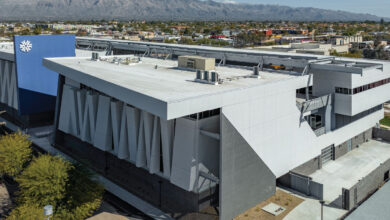
Revolutionary Heart Procedure Hits 300th Milestone at Carondelet St. Mary’s Hospital
Transcatheter Aortic Valve Replacement (TAVR) provides minimally invasive alternative for aortic heart valve repair
The Structural Heart Program at Carondelet St. Mary’s Hospital is celebrating a major milestone in providing cardiac care to the Tucson community. The St. Mary’s Heart Team recently performed the 300th TAVR (transcatheter aortic valve replacement device) implantation at the hospital. This latest milestone is an important achievement that demonstrates the hospital’s commitment to improving cardiac care for heart valve disease patients.
“Carondelet St. Mary’s continues to be a heart care leader in Tucson, pursuing advancements in cardiac treatment and technology,” said Kapildeo Lotun, MD, Carondelet Cardiovascular Director. “The Structural Heart Program here strives to provide the latest and most advanced heart procedures for our patients. The Transcatheter Aortic Valve Replacement is a great option to treat patients through a less-invasive alternative and minimize the recovery time. Our goal is to get our patients back to the life they love and the activities they enjoy.”
TAVR is a minimally invasive way to replace a patient’s diseased aortic valve without traditional open-heart surgery and while the heart continues to beat, eliminating the need for a cardiopulmonary bypass. Transcatheter aortic valve replacement is a less invasive treatment option for those individuals with severe aortic stenosis who, because of age or other medical issues, might not be considered good candidates for traditional surgery. TAVR is performed by physicians experienced in interventional cardiology, advanced cardiac imaging, cardiothoracic surgery, and anesthesiology.
Heart disease is the No. 1 cause of death in the U.S., killing more people every year than all forms of cancer combined. Severe aortic stenosis is a serious heart valve disease, which causes a narrowing of the aortic valve opening, and restricts the blood flow from the left ventricle to the aorta and may also affect the pressure in the left atrium. Many patients with severe aortic stenosis are not treated because they are deemed inoperable for surgery, have not received a definitive diagnosis or because they delay or decline the procedure for a variety of reasons. Patients who do not receive an aortic valve replacement (AVR) have no effective, long-term treatment option to prevent or delay their disease progression. Without it, severe symptomatic aortic stenosis is life-threatening. Studies indicate that 50 percent of patients will not survive more than an average of two to three years after the onset of symptoms.
The Structural Heart Disease team at St. Mary’s provide care for other heart valve diseases including MitraClip for Mitral Regurgitation, Watchman implantation for Atrial fibrillation, and Patent foramen Ovale/ Atrial Septal/ Ventricular Septal closure along with other therapies.
“Expanding cardiology services is a commitment we have been passionate about. This is a significant enhancement & investment in heart care for our Tucson community and benefits so many of our neighbors who have very good alternatives for open heart surgery. I am very proud of our heart team physicians and staff for their dedication to our cardiac patients,” said David Ziolkowski, St. Mary’s Hospital Chief Executive Officer.





